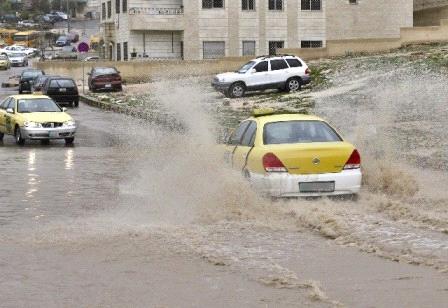Ammon News - On the heels of a depression and cold air mass that brought heavy rain to the Kingdom on Friday, which marked the winter solstice, more cold and wet weather is forecast for the coming week, meteorologist Hussein Momani said on Saturday.
A slight rise in mercury levels is expected on Sunday as the receding depression tapers off, but the weather will remain relatively cold with temperatures ranging between 14ºC and 4ºC in Amman.
Unstable weather conditions are expected to affect the country’s eastern and southern regions on Monday evening, Momani said, noting that temperatures will be the same as on Sunday.
Daytime temperatures are forecast to be slightly lower on Tuesday, reaching a high of only 12ºC, and the weather will become cloudy and rainy.
Friday marked the winter solstice and the first day of marbaniyeh: the 40 coldest days of winter, during which temperatures dip to around zero and several frost spells affect the country.
Winter in the northern hemisphere started on Friday at 11:21am, Momani said, adding that marbaniyeh ends this winter on January 29.
“Winter solstice is an astronomical phenomenon which happens when the sun becomes vertical over the Tropic of Capricorn, 23.5 degrees south of the Equator. Friday’s day was the shortest of the year and its night was the longest, totalling 13 hours, 44 minutes and one second,” Momani explained.
“Following the first day of winter, the days will start to become longer and nights shorter, until they become equal on March 20, which is the spring equinox in the northern hemisphere,” the meteorologist added.
Momani explained that marbaniyeh is characterised by very cold weather and the prevalence of “very cold and dry” easterly winds.
“Several frost spells take hold of the country during marbaniyeh due to the around-zero temperatures and very cold easterly winds,” he underscored.
The average maximum temperature during marbaniyeh in Amman is 12ºC and the average minimum temperature is 3ºC, he added.
“Also during marbaniyeh, the Kingdom receives around 30 per cent of its long-term annual average of eight billion cubic metres of rain.”
Meanwhile, Friday’s rainfall channelled two million cubic metres (mcm) of water into the country’s dams, according to the Ministry of Water and Irrigation.
The major dams, including the 110-mcm Wihdeh Dam, currently hold 51.6mcm or 16 per cent of their total capacity of 325mcm, Minister of Water and Irrigation Mahir Abul Samin said on Saturday.
“Rainfall since the start of the wet season supplied the dams with 7.5mcm, and recharged desert dams,” Abul Samin said in a statement e-mailed to The Jordan Times.
